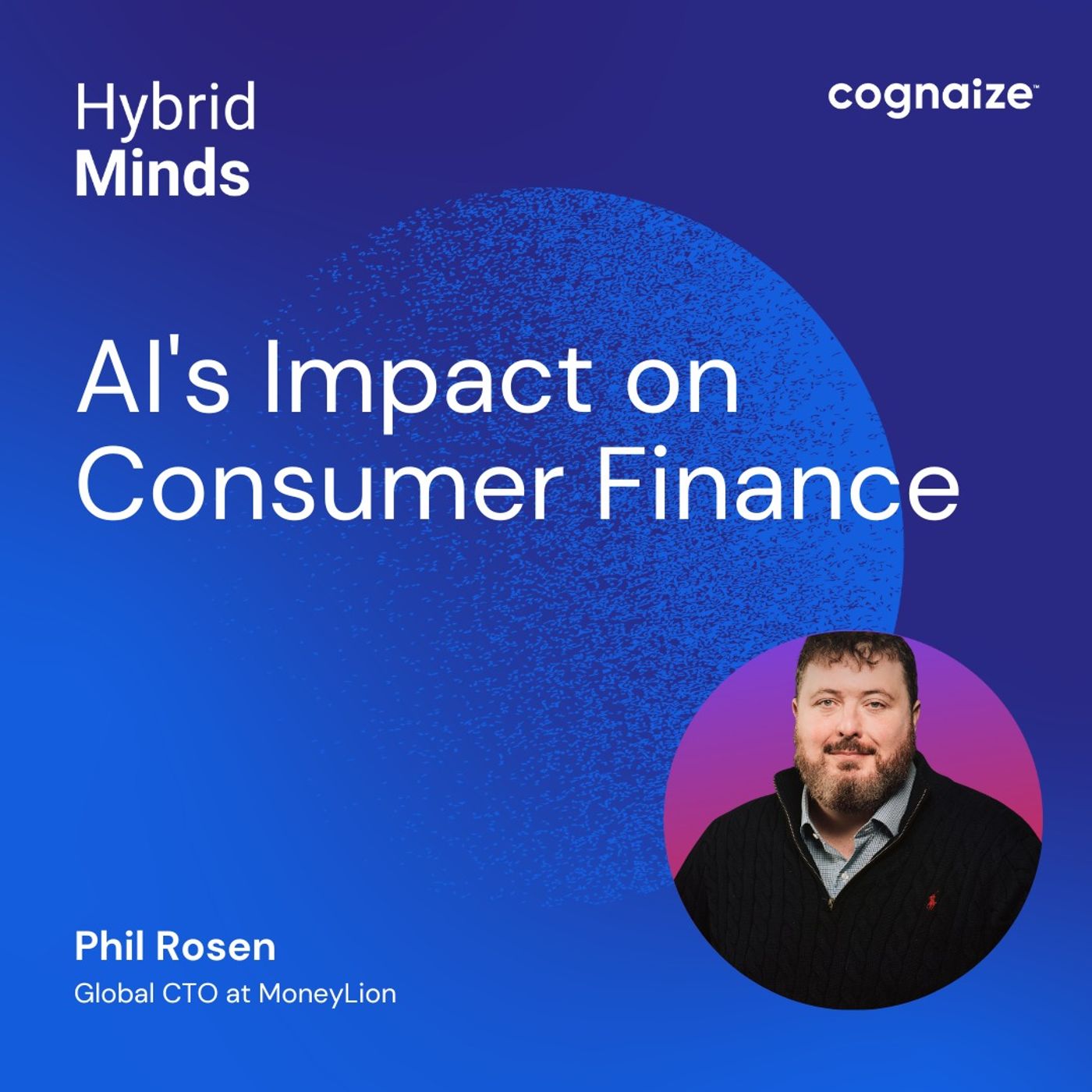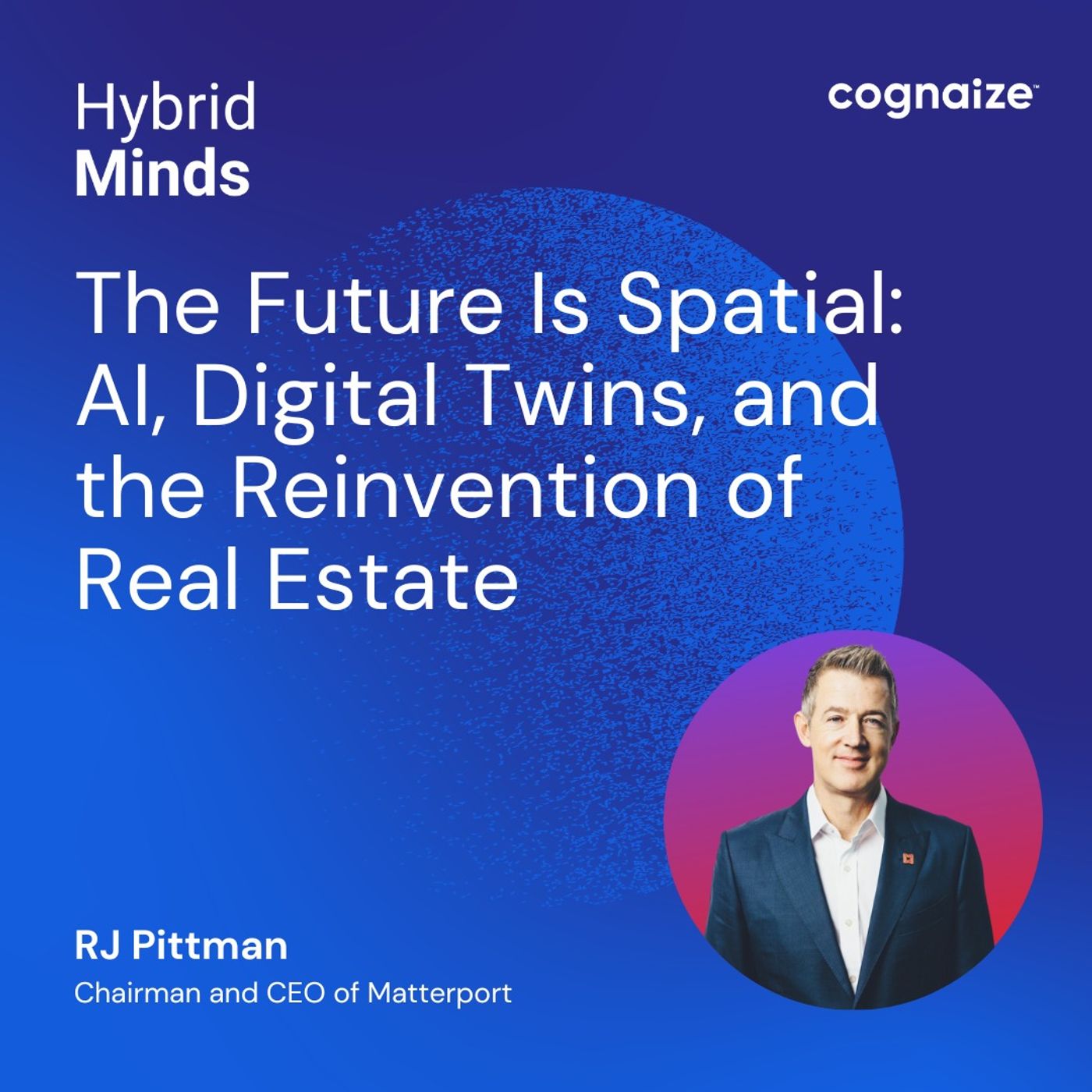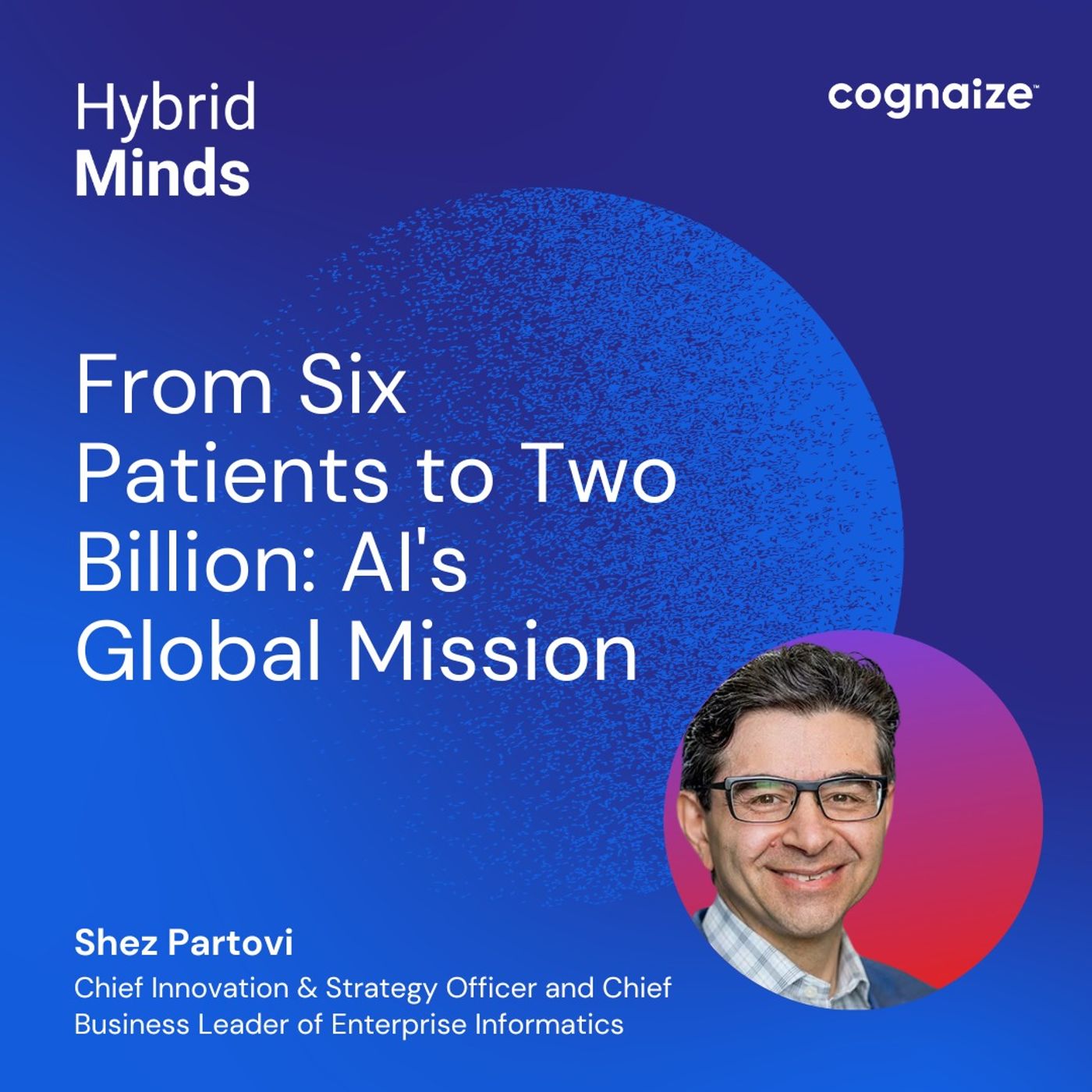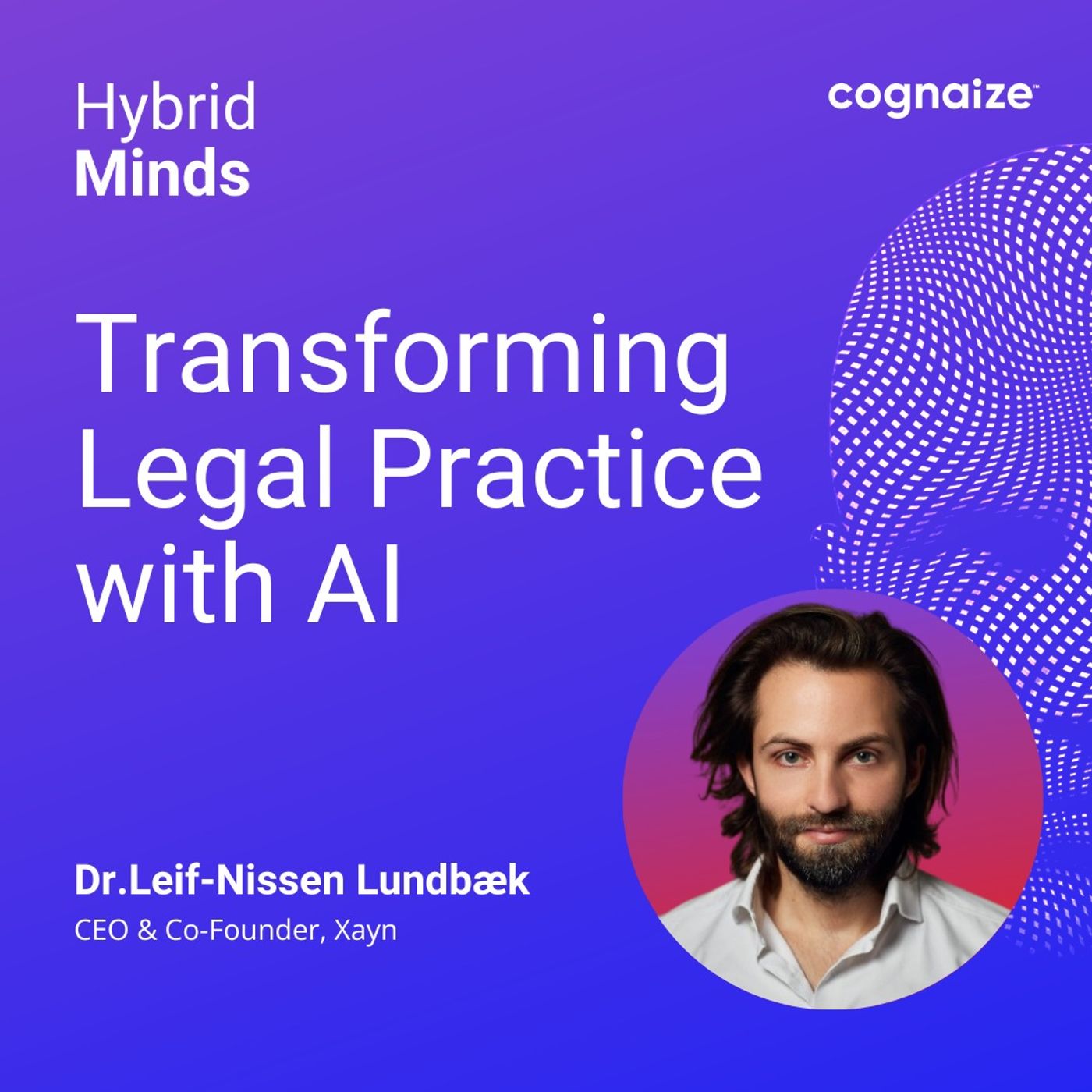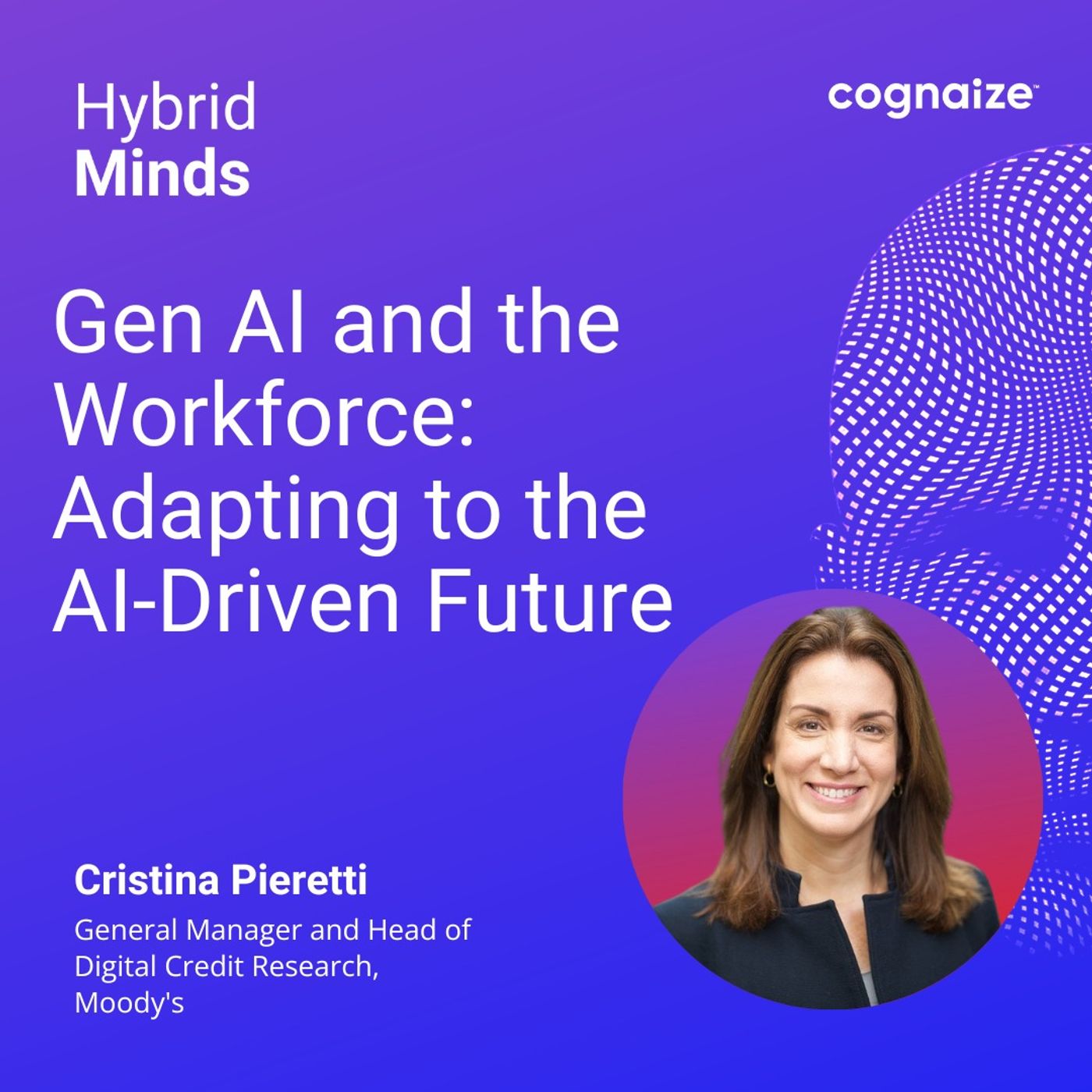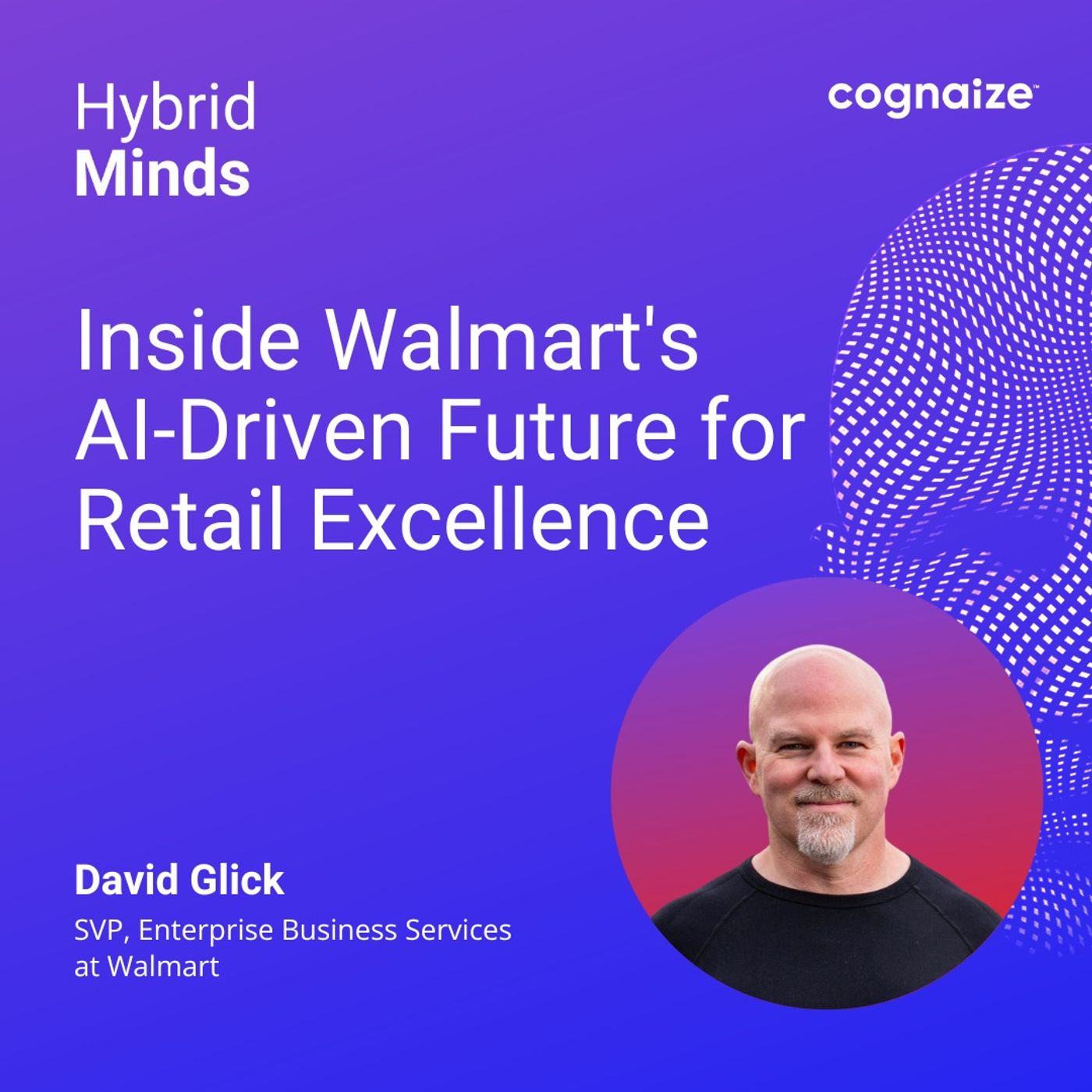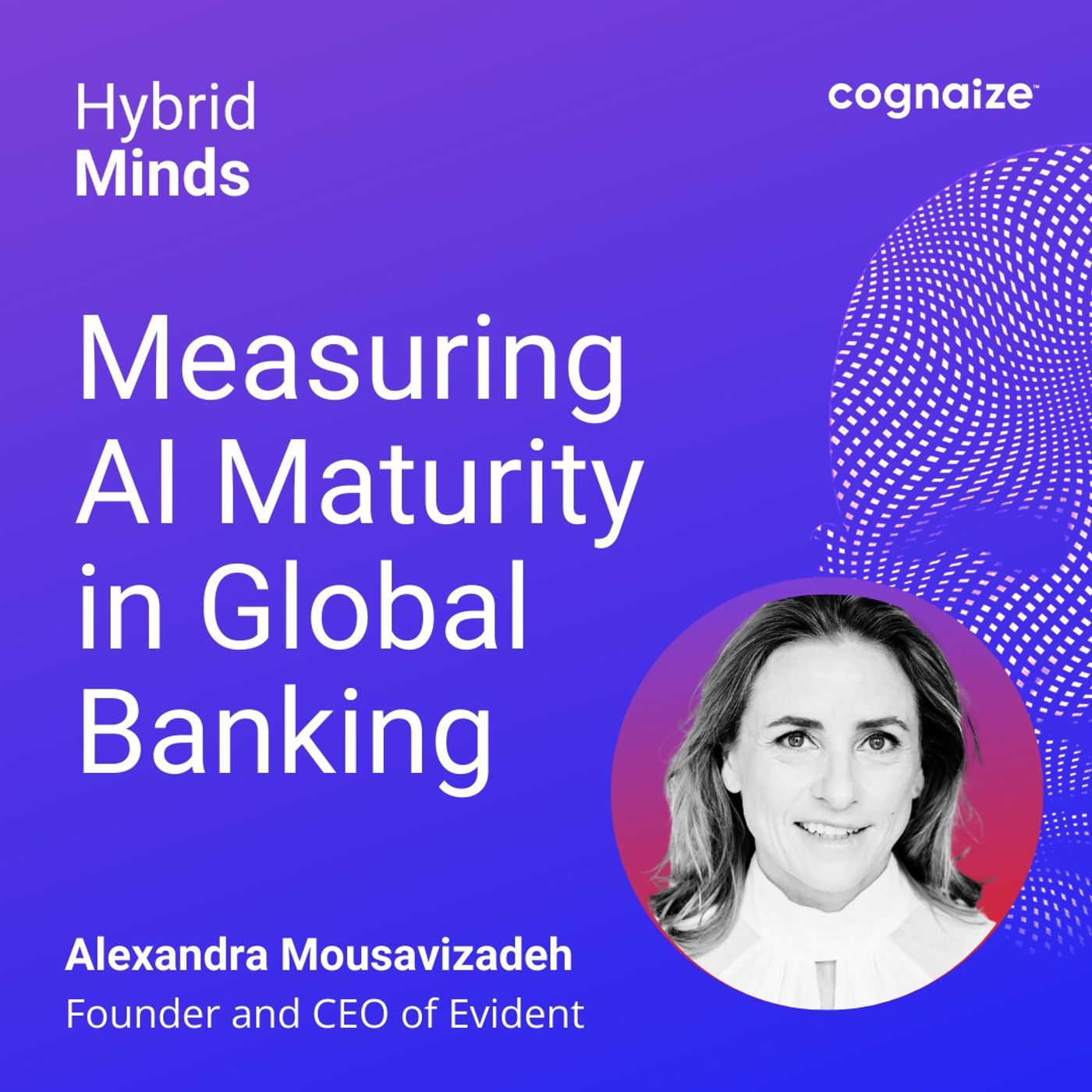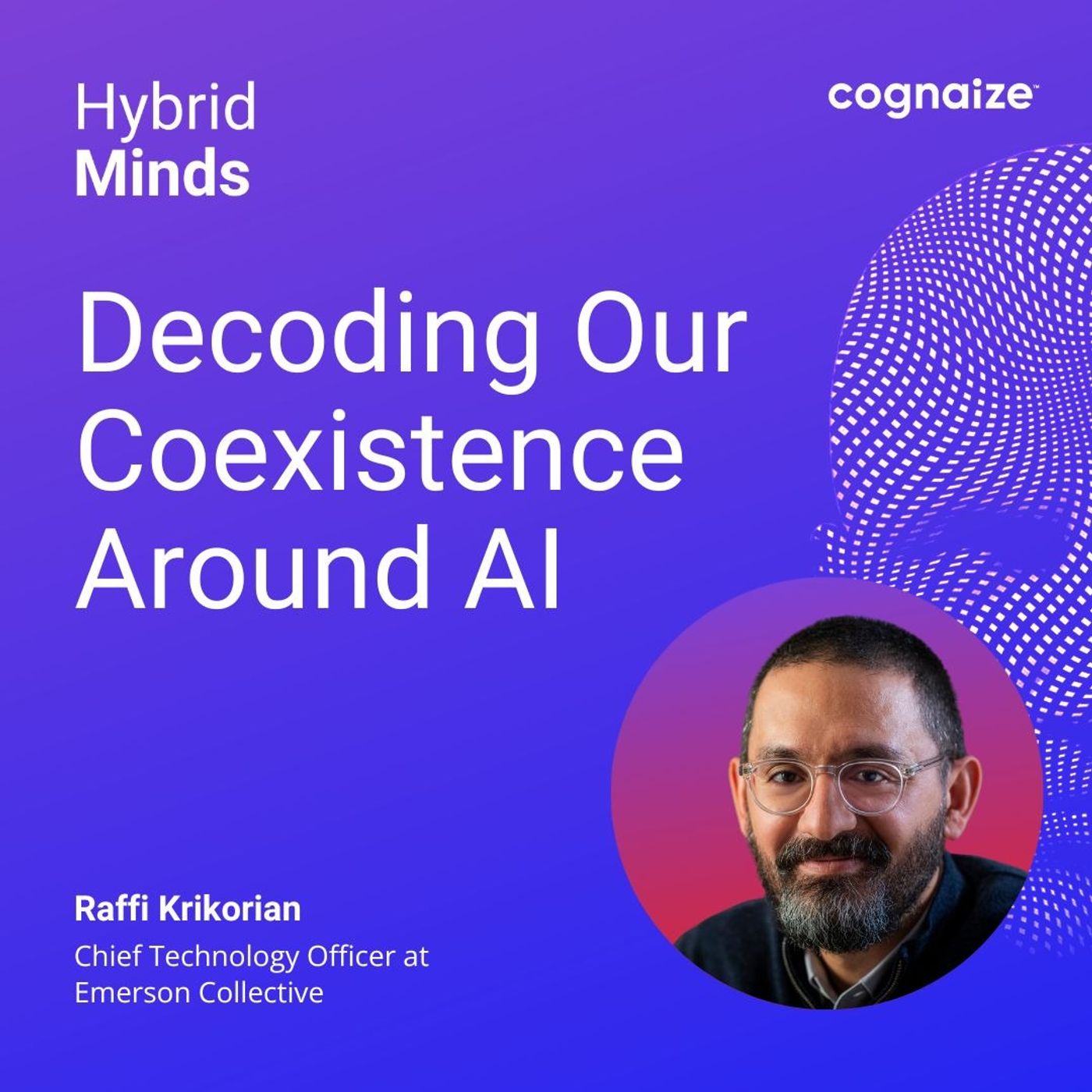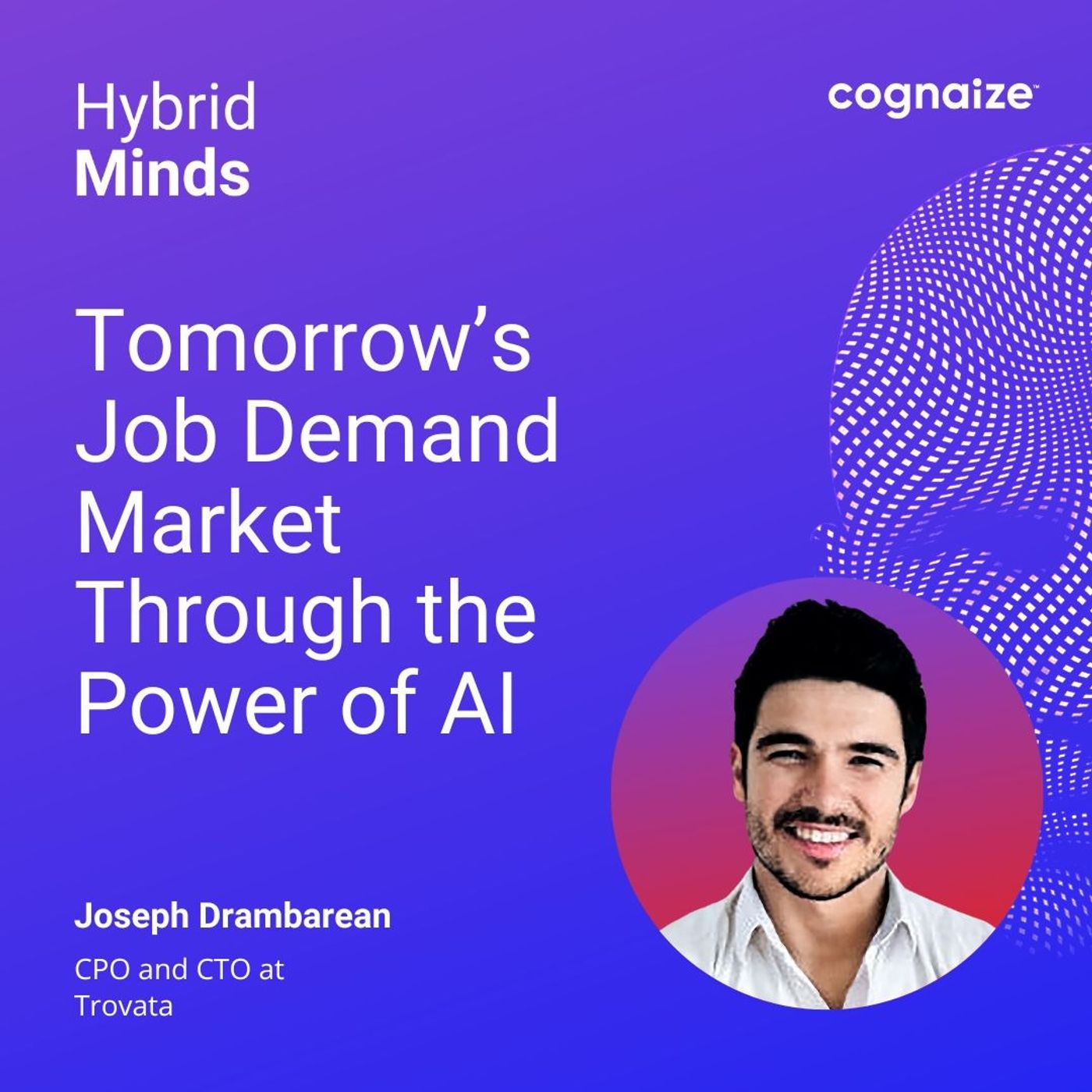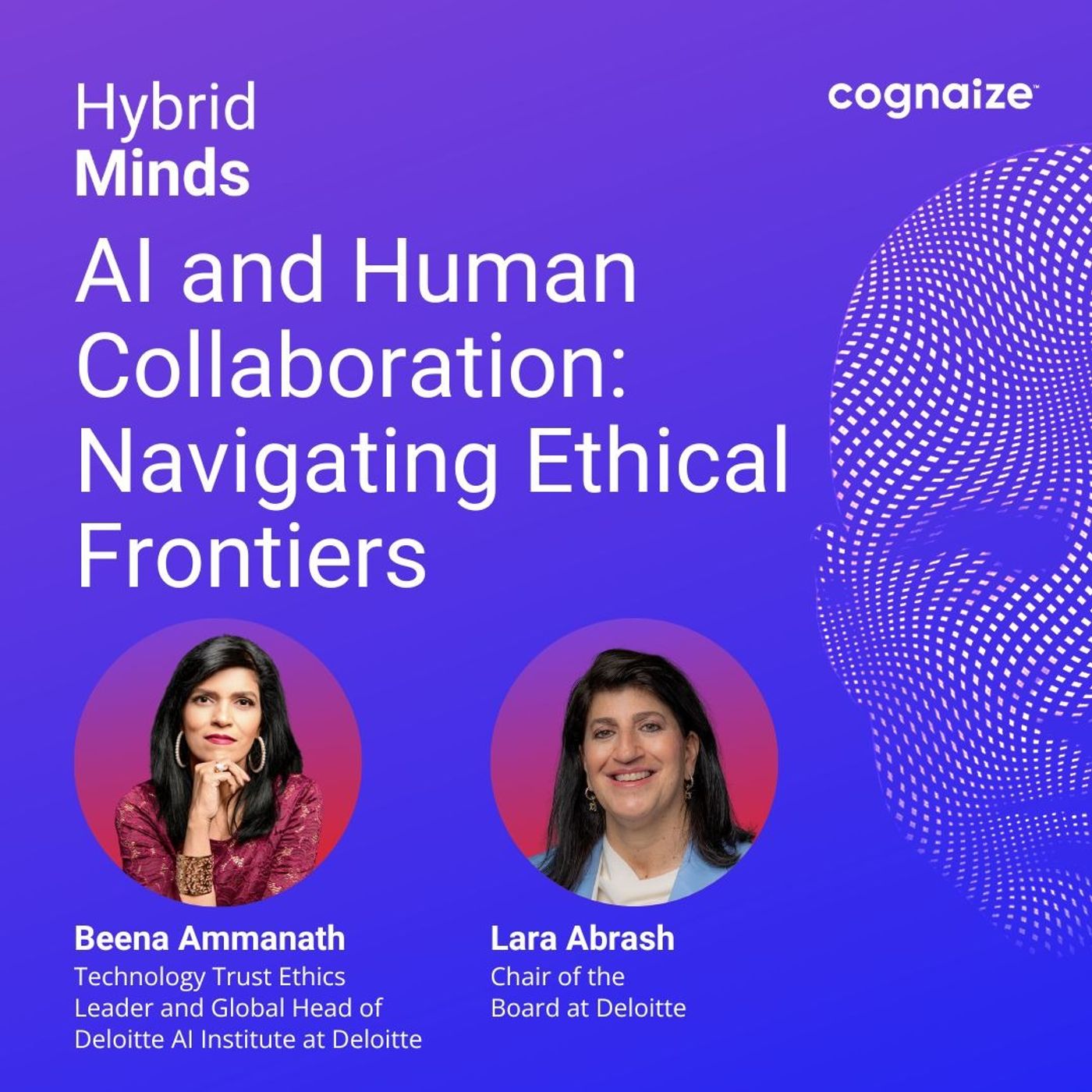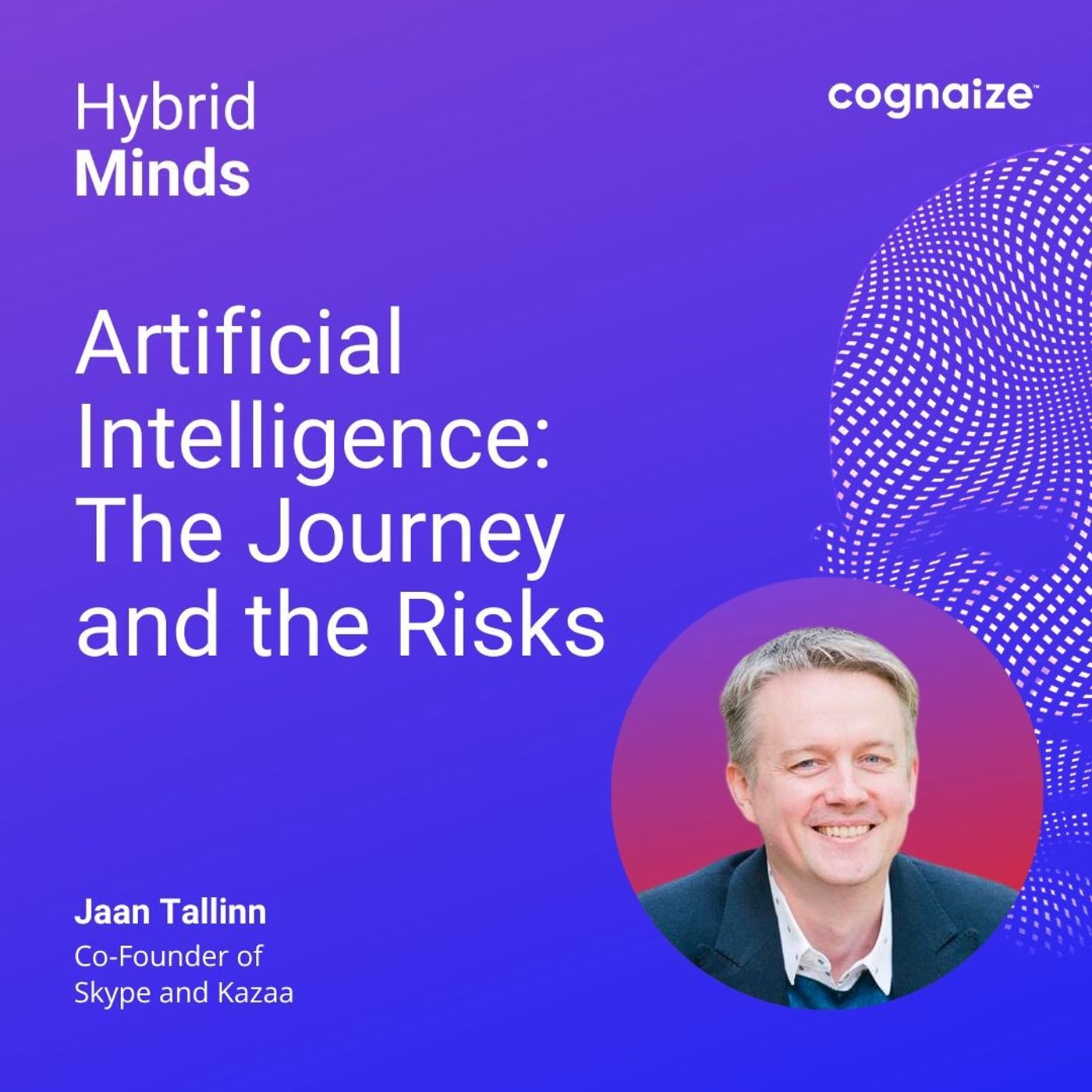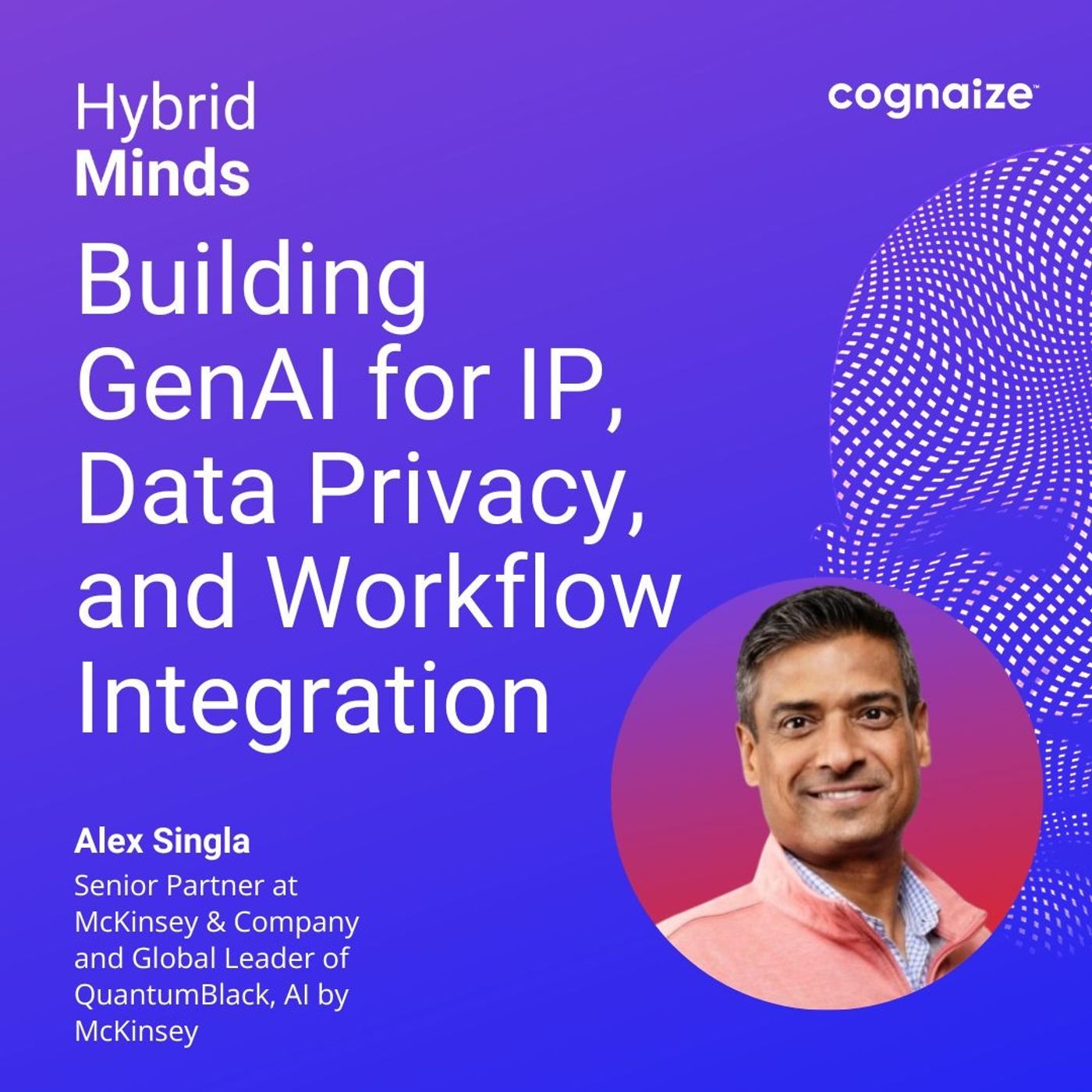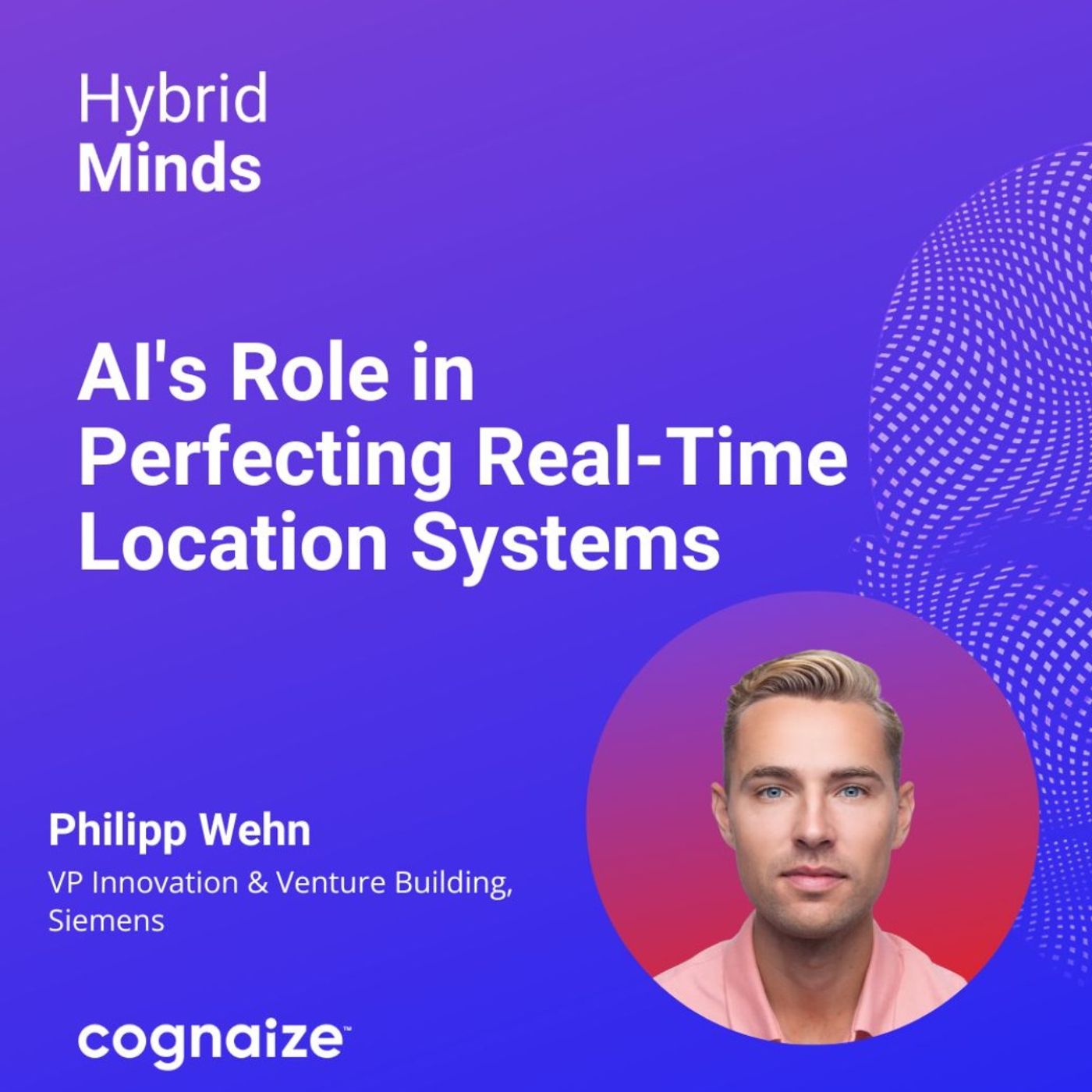Discover Hybrid Minds: Unlocking the Power of AI + IQ
Hybrid Minds: Unlocking the Power of AI + IQ

Hybrid Minds: Unlocking the Power of AI + IQ
Author: Cognaize, Vahe Andonians
Subscribed: 1Played: 4Subscribe
Share
© Cognaize
Description
Welcome to "Hybrid Minds: Unlocking The Power of AI + IQ," the podcast that explores the groundbreaking concept of combining artificial intelligence with human expertise to achieve unparalleled advancements in various fields.
In this era of rapid technological evolution, we delve into the extraordinary potential AND conflict that arises when AI and human intelligence merge, ultimately giving birth to the concept of something we call, “hybrid intelligence”.
Join us as we explore the remarkable intersection between AI and human intelligence and dive into the captivating world where AI demonstrates its prowess in surpassing human capabilities. And delve into the controversy of the real dangers and pitfalls of AI.
In each episode, we'll bring you fascinating discussions with experts at the forefront of this hybrid intelligence revolution. Discover the transformative impact this collaboration has on various industries, from finance and engineering to education and beyond.
Join us for "Hybrid Minds: The Power of AI + IQ", powered by the minds at Cognaize.
In this era of rapid technological evolution, we delve into the extraordinary potential AND conflict that arises when AI and human intelligence merge, ultimately giving birth to the concept of something we call, “hybrid intelligence”.
Join us as we explore the remarkable intersection between AI and human intelligence and dive into the captivating world where AI demonstrates its prowess in surpassing human capabilities. And delve into the controversy of the real dangers and pitfalls of AI.
In each episode, we'll bring you fascinating discussions with experts at the forefront of this hybrid intelligence revolution. Discover the transformative impact this collaboration has on various industries, from finance and engineering to education and beyond.
Join us for "Hybrid Minds: The Power of AI + IQ", powered by the minds at Cognaize.
16 Episodes
Reverse
In this episode of Hybrid Minds, host Vahe Andonians is joined by Phill Rosen, Global CTO at MoneyLion, to explore the state of AI integration in financial technology. Phill offers a grounded and technical perspective on what it really takes to build, ship, and maintain AI-powered features in production, focused especially in highly regulated spaces like consumer finance.They discuss what it means for a company to be "AI-ready," and why most businesses will still depend on human engineers for the foreseeable future. Phil also shares how MoneyLion leverages modular AI systems, API integrations, and real-time data infrastructures to deliver smarter financial products and personalized content at scale.This episode is a must-listen for engineers, product leaders, and technical decision-makers looking to understand what AI adoption really looks like behind the scenes.Key Quote: “ If you tell me that 90% of code written will be AI-assisted in some way. That's obviously possible. That's obviously something that's very easily achievable. We can have 100% of our engineers writing in Copilot. They can have some level of AI assistance involved there, and that might make them more efficient. But to take the ENG engineer out of the equation is not something most organizations can do yet.”Phill RosenTime Stamps:(02:15) Hype vs. Reality: What AI Can Actually Do Today(07:45) AI as a Junior Engineer: Gains and Tradeoffs(13:00) Building Hybrid Models for Speed, Performance, and Compliance(15:40) Infrastructure Over Models: The Real Work in AI Deployment(20:10) Vibe Coding and the Evolution of Developer Workflows(30:10) Reimagining Data Infrastructure for AI-Driven Products(38:00) Regulatory Considerations in AI ApplicationsLinks:Connect with Phil RosenVisit MoneyLionConnect with VaheVisit Cognaize
In this episode of Hybrid Minds, host Vahe welcomes RJ Pittman, Chairman and CEO of Matterport, to discuss the convergence of artificial intelligence, spatial computing, and digital infrastructure. RJ shares his vision for a future where buildings are data, real estate is programmable, and AI transforms how we manage the physical world.RJ brings two decades of experience leading at tech giants like Apple, eBay, and Google, and most recently scaled Matterport into a global platform digitizing over 55 billion square feet of physical space. Following Matterport’s acquisition by CoStar, RJ now focuses on expanding data-driven property intelligence at a massive scale.This episode is a must-listen for tech leaders, real estate professionals, and innovators exploring the cutting edge of AI, spatial computing, and enterprise transformation.Key Quotes: “ This period that we are in of technology, AI, the advancement of data sciences, unlike anything we've ever seen in humanity, not just in the tech industry, not just in any industry, set aside industry as a whole. I think the way that the human race is about to evolve is absolutely extraordinary.”RJ Pittman, on the next evolution of humanity with AI “ What people often think about super intelligent, how do you actually define what that is? And sometimes, the conventional wisdom is it's just an outsized amount of knowledge. But in other cases, it may just be that it has photographic memory on the one hand, but it also can be perfectly memory erased on the other, and, you know, changed and swapped in, and swapped out as well. With no consequence, right? And these types of fundamental aspects of what we have here, I find it to be so compelling and powerful. And then, of course, you're gonna have systems built to manage that as well, right? Is my engine getting smarter or not smarter? Is it plateauing? Do I need more data? Do I need to change, you know, the data? And managing and testing, and evaluating that on a regular basis. So it's sort of an AI-powered, you know, intelligence and health monitor, you know, for the system you've built. “RJ Pittman, on what defines true super intelligenceTime Stamps:(02:36) Balancing AI Innovation and Safety(09:42) Challenges of Scaling AI Infrastructure(14:03) Small Language Models and Their Potential(23:48) Improving Conversational AI as it Evolves(37:12) Revolutionizing Property Inspections at Matterport(44:42) The Power of Diverse Property Data(50:16) Navigating the Challenges of Hardware and Software IntegrationLinks:Connect with RJ PittmanVisit MatterportConnect with VaheVisit Cognaize
In this episode of Hybrid Minds, Dr. Shez Partovi, Chief Innovation & Strategy Officer at Philips, takes us on a visionary journey. From a pivotal moment during his time as a practicing neuroradiologist to leading Philips’ global healthcare strategy, Shez shares the story of how one lecture by a nun shifted his perspective—from focusing on six patients a day to aiming to impact billions. His background in both medicine and computer science uniquely positions him to bridge the gap between clinical care and cutting-edge AI, and his mission is clear: scale access to care and give time back to clinicians.Through real-world examples, Shez explains how AI is not just a buzzword but a tool with transformative potential in healthcare. From managing the overwhelming growth in imaging data, to enabling faster, higher-resolution scans with software upgrades to predicting heart arrhythmias days in advance, Philips is pushing the frontier of what’s possible. One standout story involves a wearable patch that can foresee cardiac events before they happen, giving physicians a chance to intervene early and improve outcomes. He also introduces an inspiring project that uses handheld ultrasound and AI to bring maternal care to underserved regions—no sonographer required, just six guided sweeps and an algorithm that does the rest.Shez emphasizes the critical importance of ethical innovation, unbiased data, and co-creating solutions with clinical partners. He shares his belief that AI’s future in medicine lies in automation, augmentation, and agility—but only if implemented with care to avoid adverse events. Whether you’re an AI researcher, healthcare professional, or just someone curious about how data can become a tool for good, this episode will leave you inspired by the intersection of compassion, technology, and scale.Key Quote: “ The power of AI in creating prediction models is one of the great unlocks in medicine, where quality and cost come together because you can improve quality and reduce costs.” We give the meaning of the data to the clinician data to the clinician.”Time Stamps:(00:41) A Pivotal Moment: From Clinical Practice to AI03:05 Innovations at Philips: Improving Global Healthcare06:54 The Data Deluge: Managing Information Overload in Medicine10:27 AI in Healthcare: Challenges and Opportunities28:36 Future of AI in Medicine: Predictions and GoalsLinks:Connect with Dr. PartoviLearn more about Philips Connect with VaheVisit Cognaize
In this episode of Hybrid Minds,Vahe Andonians is joined by Dr. Leif Nissen-Lundbeck, CEO and co-founder of Xayn, a pioneering GenAI company behind Noxtua, Europe’s first sovereign legal AI. Dr. Lundbeck shares insights into the complexities of developing a legal language model tailored specifically for law firms, legal departments, and government entities across Europe. He discusses the critical need for privacy and professional secrecy in the legal sector, highlighting how Exsign addresses secure data management to mitigate criminal risks.Gain an understanding of the unique challenges and strategies involved in data collection and model training for specialized legal applications. Dr. Lundbeck contrasts general-purpose models like GPT with Noxtua, explaining how vertical AI models can provide superior performance in specific domains. With also a look at the synergy between AI and human expertise in legal work and what the future holds for AI-driven advancements in legal practice.--Key Quotes:“The reasoning side is of course the most important, and we know the bigger you are, the better you actually deliver reasoning. If you are trained on this legal reasoning side in the first place.”“It's always about humans against machines, right? What did the human, what did the machine,right? Instead of comparing it again, okay, we should, we need a third group of humans plus machines, which can be faster and accurate.”Generally, privacy seems to be like a soft term, right? But in the legal industry, it has to be given, right? And this is not only in laws that everybody knows, like GDPR or so. But this actually has a much, much higher value because we have. For example, in Germany, professional secrecy. So professional secrecy is, regulated, under criminal law. And, we have that in Austria, Switzerland, Italy, and France. And, that actually means that, if you essentially share legal data involving multiple parties, and you share this or, publish this somewhere where it should not be that this actually is a criminal act.”--Time Stamps:(00:00) Developing Legal AI for Privacy Compliance(12:10) Advancements in Legal AI Development(26:10) Optimizing Legal AI for Multilingual Tasks(31:47) Legal AI Trends in Multilingual Translation(46:35) AI Value Delivery in Industry Awakening--Links:Connect with Dr. LeifLearn more about XaynConnect with VaheVisit Cognaize
In this episode of Hybrid Minds host Vahe Andonians is joined by Cristina Pieretti, General Manager and Head of Digital Credit Research at Moody's Analytics, who discusses the transformative power of artificial intelligence, particularly the potential of Gen AI to revolutionize industries. She emphasizes the importance of staying on top of innovations and finding the right partners to execute AI solutions. Pieretti also addresses the challenges of implementing AI, such as cost, computational power, and the need to prioritize privacy and trust through robust risk and control frameworks.As AI continues to evolve, Pieretti envisions a future where web interactions are radically different, with AI becoming an integral part of our daily tasks. Gen AI, she explains, has the potential to bring immense efficiencies and insights to financial markets and other sectors. However, she notes that the responsible use of AI is vital, requiring governance frameworks and regulations to ensure trust and safety. Privacy and computational challenges must be managed carefully to make AI solutions feasible and reliable.Pieretti also highlights the broader societal implications of AI, particularly its impact on job security. She stresses the importance of embracing change, developing new talent, and adopting flexible, agile approaches to different AI models. As AI becomes more deeply integrated into everyday life, adaptability and collaboration will be essential for successfully navigating the AI-driven future.Key Quote: “Here the aspirations of many people that are looking to leverage an AI. They want the machine to think. They want to provide insights. They want to say, okay, what's different? Can you tell me how it has changed? How do I really, again, going to this topic of generating alpha, how do I drive not only efficiencies, but drive also revenue growth.”-Cristina PierettiTime stamps:(00:48) Creating Successful AI Products(03:30) Challenges of Cost and Computational Power in AI Implementation(06:18) Privacy and Trust in AI Applications08:59 The Future of Web Interactions with AI(12:21) The Impact of AI on Job Security and Talent Development(18:19) Flexibility and Agility in Adopting AI ModelsLinks:Connect with Cristina Learn more about Moody’s Connect with VaheVisit Cognaize
Join host Vahe Andonians for an engaging discussion with David Glick, Senior Vice President of Enterprise Business Services at Walmart, as we explore the multifaceted role he plays in driving technological innovation within the company. From payment systems to people technology, and even legal tech, David sheds light on the vast responsibilities that fall under his purview. We also discuss Walmart's strategic shift towards building more in-house systems to handle its massive scale better, enhancing both agility and customization. Listen in as David shares his insights on managing a large engineering team and the significance of digital transformation and generative AI under the leadership of CEO Doug McMillan.We delve into the intricate integration of AI and human expertise, particularly through Walmart's innovative platform, Element, which optimizes the selection of AI models for specific tasks. Discover how the challenges of prompt engineering are being addressed and how AI is transforming internal knowledge management. The discussion highlights the importance of achieving accurate, deterministic answers in critical scenarios and the dynamic interplay between AI capabilities and human oversight. This chapter provides a fascinating look at how Walmart is harnessing AI to enhance efficiency and integrate new technologies seamlessly into existing workflows.Finally, we explore the broader impact of AI on large organizations and the retail sector, focusing on Walmart's pioneering efforts. AI's transformative potential is immense, from boosting productivity and improving customer service to revolutionizing e-commerce personalization and inventory management. Hear David's optimistic perspectives on AI and its future, as well as ethical considerations and the importance of precise guidelines to ensure responsible AI use. This episode is a compelling journey through the innovative ways Walmart is leveraging AI to stay at the forefront of technological advancement.Key Quote :"I'm always skeptical of the term guardrails. These guardrails [are] like we're going to make sure that you don't drive off the cliff into the, into the river or into the ocean, but can we be more precise in guardrails? I'd rather have lane lines, guardrails are, if you missed the lane lines and you're not paying attention and this and that, we're going to save you, but could we be more precise and say, 'look, you need to be between these lane lines.' And obviously, there's philosophers and the best engineering talent in the world and governance and lawyers and everybody who's trying to weigh in on this."-David GlickTime Stamps:(00:45) What is Enterprise Business Services at Walmart (01:55) Building vs. Buying: Walmart's In-House Strategy(05:28) Integrating AI with Human Operations(08:15) Challenges and Opportunities in AI Implementation(20:38) AI's Impact on Retail and E-commerce(33:45) Ethical Considerations with AI ImplementationLinks:Connect with David Visit WalmartConnect with VaheVisit Cognaize
On this episode of Hybrid Minds, join host Vahe Andonians and special guest Alexandra Mousavizadeh, CEO of Evident, as they delve into the complexities of the Evident AI Index and its transformative impact on the banking sector. The two explores the pioneering methodology behind the index, its role in assessing AI maturity across global banks, and how North American banks are leading in AI adoption. Gain insights into the strategic moves propelling these banks to industry leadership.Venture further into the dynamic world of banking and AI with a discussion on JP Morgan’s innovative AI strategies, highlighting their approach to achieving excellence in AI integration through dedicated research teams and strategic partnerships. Alexandra and Vahe tackle the responsible use of AI, emphasizing the importance of agility and strategic talent acquisition within the banking industry.Tune in as they analyze the challenges and emerging trends in AI deployment, considering the potential risks and rewards. Alexandra sheds light on environmental concerns and the increasing significance of open-source models, essential for both large banks and smaller entities.Alexandra concludes with a critical look at the societal implications of AI, from debates over Artificial General Intelligence to the pressing need for regulation on social media platforms. Don’t miss this comprehensive exploration of how AI is reshaping not only business landscapes but also societal structures.Key Quotes: “The way that the large language models are trained on the vast data set, the data labeling aspect there is maybe a bit less pronounced, but data labeling is certainly taking place, to run AI effectively on it. And the data labeling is still needed. So there's that aspect of the labor and we would, you know, talking before about the sort of the war on talent is one thing, sort of, how as a business, are you attracting the best talent and what are the components that you need to have in your business to attract the best talent and that war on talent is only intensifying with the need for Chief AI officers a need for strategic thinking for across the business to find people that are really good technically and also really good strategically and understand the business and the business value of AI and sort of how to invest in AI so it really gives that return on investment that everyone is expecting and the shareholders are expecting.”“The businesses that don't think about and very quickly think about the adoption of AI and the adoption of Gen AI are at the risk of going out of business. The jobs are on the line because The business might close down if it can't keep up and it can't keep up and stay competitive.”“The banks are testing it all out. They're saying, look, we've got these 500 different types of use cases, and they might just not all need an open AI capability. They might just be absolutely fine with some of the solution that is open source, by the way, right. That you can then fit into your own private data pool. And a lot of banks are experimenting with that. Where it shakes out, you know, we don't quite know, but the experimentation of using the open source ones to fit it onto your own data is, is being tested.”Time Stamps:(02:09) Understanding the Evident AI Index(05:15) Top leading Banks in AI today(20:15) War on Talent and Data Labeling(38:40) Implications of AI for SocietyLinks:Connect with Alexandra Visit Evident Connect with VaheVisit Cognaize
Join host Vahe Andonians and dive into the fascinating world of AI's impact on the financial sector with Hanna Helin, Global Head of Technology Innovation at the London Stock Exchange Group.In this episode, we explore Hanna's career journey in AI and technology, unveiling the seismic shifts brought about by AI in financial institutions. From the bedrock role of cloud computing and big data to the transformative power of OpenAI's GPT, we navigate through milestones that have democratized AI access and reshaped new markets.Hanna delves into the intricate tapestry of AI regulation within financial services, balancing innovation and governance in a global context, from European GDPR to shaping AI's trajectory worldwide.Discover the London Stock Exchange Group's transformative AI journey, the challenges and triumphs of integrating AI into operations, and the impact on customer solutions. Hanna shares insights into the delicate balance between regulatory frameworks and competitive advantage.As we explore the harmonization of human insight and AI precision, Hanna emphasizes the importance of tailored AI models and the integration of human feedback for a cyclical, evolving workflow. From ethical complexities to potential global divides, we highlight societal impacts and the necessity of collaborative global governance.Tune in for a captivating discussion on universal AI literacy, the transformative power of AI on productivity, and the role of shared knowledge in catalyzing innovation across enterprises!Key Quotes: “I think there's definitely a promise there to the whole discussion about co-pilot experience, or I think many people describe AI as kind of your assistant, which will do those manual tasks that you had to do previously and you get freed up that time to do something completely different. I think that itself will evolve how all of us will work both in our personal life and then in our normal roles as well going forward.” ”I think as an organization, we have been using AI for a long time. I would say specifically around our data management processes and as we bring in new content for our financial services customers, AI has always always been there and for a long time, obviously, with large language models, we are staying very close to the market, seeing that how our financial services customers will want to evolve their workflows going forward.”Time Stamps:(3:10) Evolution of AI and Technology Leadership(10:33) AI Regulations in Financial Services(13:14) LSEG’s own AI development(17:17) Integrating Human Feedback Into AI(24:05) Encompassing global ethics and diversity with AI(37:45) Solving the challenges of tomorrow with AILinks:Connect with HannaLearn more about LSEGConnect with VaheVisit Cognaize
On this episode, host Vahe Andonians welcomes the brilliant Raffi Krikorian, CTO at Emerson Collective, to discuss the intricacies of control and responsibility we share with technology. Together, they unravel the threads of human influence over tech evolution, challenging the pervasive notion that we're at the mercy of these digital forces. The conversation navigates through the ethics of AI, the societal impact of tech centralization, and the pivotal role of open source in maintaining a rich tapestry of innovation. Vahe and Raffi scrutinize the ways companies leverage our psychology to hook us on their products, underlining the importance of introspection in understanding tech's grip on our lives. Listen in as we explore the complex relationship between AI and the democratic process, particularly in the context of elections. They illuminate the balancing act required to harness the power of open-source AI for good while guarding against its potential to spread misinformation and influence voter behavior. Together, they ponder the responsibilities of platform companies, the importance of government regulation, and the value of public education in safeguarding our electoral integrity. Moreover, we delve into the visual and emotive frontiers of AI, from the nuances of voter outreach to the labyrinth of self-driving technology, and envision a future where AI collaboration elevates human potential. In this episode, we grapple with the monumental task of maintaining societal awareness amidst rapid technological change. Hear insights on the approach to AI education, and the moral imperatives driving the use of beneficial AI in healthcare and probe into the difficulties of predicting future challenges in an era of exponential growth, stressing the importance of learning from past tech scaling experiences. From the impact of social media and atomic energy to the timeless wisdom of standing on the shoulders of giants, our discussion with Raffi offers profound reflections on progress and the iterative nature of innovation. Tune in for a journey through the past, present, and future of our coexistence with technology.Key Quotes: “We're in an arms race, but it's not an arms race of, who can build better technology. It's an arms race of, this technology is happening so quickly, and our society absorbs things not at that pace. And I'm not, by no means am I advocating slowing down, but I think just even awareness that that's the issue I think is really important because then we can start to address it, whether it be through education or others. We need a better way for people to really truly understand what's happening. Otherwise, we go into this runaway scenario.”“A lot of these lessons have been learned already. And we just need to be better scholars of what's happened in the past for us to take those lessons moving forward and really focus on what's actually new here. Like we don't need to reinvent the wheel 12 billion times what's actually new. Let's focus our energies and understand that. So, let's not just dismiss scholars who've worked on other issues. Let's not dismiss regulation that's already occurred in the past. Let's figure out what's new and make sure we stand on the shoulders of giants and get this one right.””I would say open source is clearly the answer. We need to have transparency into what's going on. That is going to be the road to both security and to innovation. I think there's a whole set of pros around it. However, in 2024 with the elections going on,This set of tools can now be used in a rampant way to confuse voters, to spread misinformation, to do all these things. I'm not by any means saying we should stop them.I'm not by any means saying that, that, that we should clamp down on open source and leave it only to the closed source companies that control their platforms to regulate themselves. Because again, we can't really regulate as a country or a government. We haven't quite figured out how we're going to pull that off yet.However, that is the key wrinkle. So I feel like whenever we have this debate about open source and AI, it really comes to the weaponization of these, of these tools. And through the hyper lens of 2024 elections coming up, I understand that argument. I'm still willing to bet on the long run, which is like, this is the path to security, safety, and innovation.But 2024 is going to be a rough wrinkle, whether open source is what's going to cause it, whether these tools in general is what's going to cause it.”Time Stamps:(01:30) Humans’ relationship with technology(14:28) The Role of Open Source in AI Development(25:26) Understanding Communication and Space(28:40) Human Coexistence With AI in the Future(33:55) The Ethical Implications of AI(43:30) The Complexity of Predicting Future ChallengesLinks:Connect with RaffiVisit Emerson CollectiveConnect with VaheVisit Cognaize
Join host Vahe Andonians in a captivating discussion with Dr. Thomas Fuchs, Department Chair of Artificial Intelligence and Human Health at Mount Sinai, as they delve into the profound impact of artificial intelligence on personalized healthcare and early disease detection.Exploring vital aspects like the ethical considerations surrounding AI, the potential of hybrid intelligence, and the expanding role of AI in drug discovery and complex data interpretation, Dr. Fuchs underscores the pivotal role of AI as both a tool for physicians and a catalyst for advancements in healthcare.In addition, Dr. Fuchs addresses the challenges of explainability in AI decision-making compared to human doctors, emphasizes the value of large language models, and explores the potential of AI in delivering previously inaccessible healthcare solutions to remote or underserved areas worldwide.Key Quotes: “Just to keep the standard of care, you're going to need AI. Then if you go beyond, of course, the U.S. or Europe, there are many areas in the world where we only have one or two pathologists for the whole country, they are completely underserved. And that's a very good example where AI can lead truly to the democratization of access to healthcare.”“The hope remains that we can go beyond human capabilities and that's probably done with other technologies than the human works, right? There's so much pain and suffering in the world and we have an obligation to reduce that if we can build systems, even if they are different than us. Their intelligences are different than ours. If we can deploy them to help patients, we are morally obliged to do so.”“Reducing your information input can't possibly lead to a better outcome. So then what you could argue is that there are so many outside constraints, because of processes, procedures, and the healthcare system in general, that more information would lead, for example, to overtreatment. But in general, you should never shoot the messenger, but deal with the message.”“What's also important to understand in healthcare, that very often, at least from my machine learning colleagues is that ethics in medicine is, of course, a very old field and you have bioethicists and bioethics groups, in academic medical centers, universities, and healthcare systems, since, a long time and who do ethics in healthcare for decades.”Time Stamps:(2:01) The information tidal wave in healthcare(5:39) Bringing LLMs to healthcare research models(15:34) Keeping up the ethical standards of healthcare with AI (29:25) Using hybrid intelligence of humans and AI for better healthcare(34:50) AI’s impact on research in healthcare(39:52) Modeling AI more towards the human brainLinks:Connect with Dr. ThomasVisit Mt. Sinai Connect with VaheVisit Cognaize
Join host Vahe Andonians on the latest episode of Hybrid Minds into the dynamic realm of AI's transformative impact on creativity and the workforce in this engaging episode featuring Joseph Drambarean, CPO, and CTO at Trovata. Discover how AI is not just a tool but a catalyst for personal growth, making individuals more creative, faster, and ultimately more prolific.As Joseph navigates the evolving landscape of AI, he challenges the common narrative about job displacement, offering a nuanced perspective on how technological adoption reshapes the landscape of human capital needs over time. Gain insights into the exciting future Joseph envisions—a seamless blend of human and AI creativity, where the lines between "us and them" blur, creating a space for unprecedented, uncharted behavior and collaboration.Delve into the depths of AI's impact on creative exploration as Joseph shares his experiences launching a generative AI tool. Explore the joy and engagement that result from human-like interactions with AI, and how this symbiotic relationship is poised to redefine our understanding of creativity.Join us for a captivating exploration of the intersection between AI and human ingenuity, where Joseph's expertise and forward-thinking insights shed light on a future where innovation, creativity, and technology converge to shape a new frontier of possibilities.Key Quotes:“If you adopt this technology, it makes you a better version of yourself, ultimately. A more creative, a faster, a more productive, a more prolific version of the skill set that you already kind of had innately.”“When you think about it from a job's perspective, it's not as simple as just saying, ‘Oh, well, AI is just simply going to replace this job, period, today, because it's just better and more effective.’ I don't think that that's how society works, I think what happens is that over time, there are, there's adoption of technology. And that plays out into how the needs for human capital get played out. Whether it's in current job functions that exist or that are redeployed because of innovations or advancements that took place.”“We yearn for this type of interaction at our core. Being able to create in this way. Being able to create almost something analogous to us, right? And be proud of it and because we're striving so hard to do that, we're going to want to have a relationship with whatever it is that, that this thing is, right? And I think it's going to create for special behavior. I think it's the almost behavior that is uncharted, that we don't even understand. And I think right now, what tends to play out is this us versus them. When in reality, I don't think that's what's going to happen. I actually think it's going to be us and them blended in a way where you can't even differentiate. And that's what I think is most fascinating about how this plays out.”“Our natural tendency as creators is to fiddle. When you have something that you know you can tinker with, and you want to see, ‘Well, what if I ask it in this way.’, or ‘What if I rotate it in this way.’ or ‘I wonder if I apply this shade to it.’, or ‘I wonder if I shake it and then I look at it, you know, what will happen?’ When you have the low latency experience of being able to get the satisfaction of the result of any one of those dimensions, or modalities, and have it at your fingertips, and be able to access it within seconds, this is why I'm so confident that the creative forces that are innate in all of us, they get extracted because of this, this pattern. And that's why the willingness to leap and take risks is so aggressive. Because we're, we're just naturally built for it.”Time Stamps:(00:33) - The future of jobs with AI(06:06) - How AI has already evolved its impact on society today(17:55) - The human creative process with AI enhancement(26:30) - Understanding the computational power supply and demand(37:20) - Launching TrovataAILinks:Connect with JosephLearn more about TrovataConnect with VaheVisit Cognaize
This week, join in on an engaging conversation with Beena Ammanath, the driving force behind the Global Deloitte AI Institute and Trustworthy AI, and Lara Abrash, Chair of Deloitte US, in a captivating dialogue exploring the evolving synergy between human intelligence and AI, along with its profound ethical and societal implications.Beena sheds light on the boundless potential of AI as it transforms industries and simplifies everyday tasks, underscoring its emergence as a powerful tool across diverse sectors.Meanwhile, Lara delves into the challenges organizations face amid the rapid evolution of AI, emphasizing the critical need to foster fair and inclusive opportunities in its application.Together, they emphasize the imperative of embedding ethics into the core of AI development and more broadly throughout organizational frameworks. Their insightful conversation navigates the intricate intersection of technology, ethics, and societal impact, highlighting the pivotal role of responsible AI deployment in shaping our collective future.Key Quotes: Beena - “I envision where AI, if we do it right, will become a very powerful tool in our toolkit. Whether it is to write code faster, whether it is to debug faster, whether it is to, you know, Find directions or help explain medical terms in simple language. There are so many ways it can become a true co-pilot for everything that we do.”Lara - “Generative AI is not something that's going away. It's ultimately about being focused on things like reliability and trust and also making sure that our capabilities of our humans are evolving as the technology's evolving so we have the ability to have more of us capable of understanding, leveraging, and analyzing generative AI. And ultimately, my biggest takeaway is we're going to use it where it makes sense. But hopefully, as a society, we don't use it where it doesn't. “We need to be focused on being fair, responsible, and transparent on our adoption. We have to make sure we have the appropriate safeguards and make sure it focuses us on the ability to utilize AI in the area it's intended, really as a tool.”Time stamps:(1:10) - Experience so far in AI(3:58) -Realizing the lack of ethical standards across companies’ policies (5:25) - The balancing act of public trust in AI(6:35) - Deloitte’s Generative AI Dossier(10:45) - Expanding the accessibility of GenAI (12:30) - Ethical considerations as GenAI expands for humanity’s best interests(15:05) - Looking ahead to the next chapter in GenAI
Join us on this fascinating journey as we sit down with Jann Tallinn, the founder of Skype and Kazaa, to explore the groundbreaking world of AI and its potential implications for society and businesses. Listen in as we tackle the difference between summoning AI and aliens and discuss how it impacts our ability to control the outcomes of AI development. We also delve into the idea of computational universality, the Church-Turing thesis, and how AI is advancing rapidly due to the need for significant computational resources. Additionally, we ponder if aligning AI development more closely with the functioning of our brain could lead to a decrease in the computational power currently required for AI. The conversation doesn't stop there, though. We venture into an examination of the three components that can potentially increase AI power and how context learning allows a model to modify its behavior according to a given context. The risks associated with AI's black box nature, the difficulty of predicting how AI might act in the future, the public's attitude towards AI, its potential economic implications, and the increasing leverage of technology are all on the table. Jaan shares his insights on these critical topics as we underscore the fact that the number of futures that contain humans is a small target as technology advances. Lastly, we discuss the potential implications of AI and how it differs from the human brain. Jaan provides intriguing insights into the need for regulation and the potential pitfalls of having one company control the compute. We debate the pros and cons of constraining AI experiments and consider the potential risks of centralization versus existential risks. Don't miss out on this illuminating conversation with Jaan Tallinn as we traverse the captivating world of AI.Key Quotes: Ultimately, we were developed by evolution, right? So it's like an evolution had like no idea what it was doing. It wasn't planning ahead like at all. Ultimately there is no kind of like knockdown argument that you can't reach things with just throwing compute that it. It's clear that human brains are doing things that no AI are currently doing.I just like file it under the general problem that are the current paradigm of neural networks just are black boxes that are grown, not built. therefore they're very hard to get actual guarantees about their performance and the performance failures, again as you're gonna repeat the value of AI is kind of mostly measured by its mistakes or by, its more generally by its misbehavior.We have had warnings from the people like Alan Turing from 70 years ago. He said that once AI becomes as powerful as humans we should expect to lose control to it. We didn't really spend much of that 70 years researching ways how to remain in control or how to make sure that the future goes well with AI that is potentially more powerful than humans. So we should catch up. We should to do more, more [of] that research. But in order to do that research, we need time. Time Stamps: (00:24) - AI's Risks and Opportunities(13:34) - AI Advancements, Risks, and Regulation(20:13) - Neural Networks and the Need for Regulation(25:18) - Centralization Risks Versus Existential RisksLinks:Learn more about Jaan TallinnLearn more about the Future of Life Institute Connect with VaheCheck out all things Cognaize
In our insightful conversation with Alex Singla, Senior Partner at McKinsey & Company and Global Leader of QuantumBlack, AI by McKinsey, we tackle the most commonly asked questions about generative AI and how to implement it effectively. Listen in as Alex sheds light on identifying company-specific opportunities, organizing and governing AI tools, balancing risk and value creation, and navigating the future of talent and tech stacks. We also take a look at the journey of getting started and learning quickly to harness the power of generative AI. We explore the art of creating cost-efficient, scalable solutions that drive adoption and navigating the learning process to maximize speed, cost structure, and reusable code. Our conversation focuses on the delicate balance between moving too fast and too slow in the competitive AI space. We also weigh in on the role of large language models in achieving industry-specific solutions and how to optimize them for efficiency. Further into our discussion, we address the complexities of building and leveraging large language models, focusing on the costs, pros and cons of in-house building, and the importance of data privacy and IP protection. We then examine the skills needed to run these models, the learning curve, and the economic value derived from this process. The discussion concludes with a look at how generative AI can be used to improve customer experience and how to implement safeguards to avoid unethical behavior. Join us for this informative and thought-provoking episode with Alex Singla!Key Quotes: In many worlds, speed itself is a strategy. If you and I were doing exactly the same thing, but I'm just faster, every time I'm faster, I will continuously beat you, right? And so, speed itself is a strategy. What I don't mean by that is like reckless speed, I'm not saying that. I'm saying in general, speed is a strategy.Some of what you learn is not just what you build, like what solution you build, but how you build it matters a lot. Why the how matters is because if you build things in a way that get to the better answer faster, you ping off the cloud less often, and therefore you have less consumption. If you provide better results on your first query versus your fifth query, your employees or your customers get a better response faster. And so all these things make, have impact on scalability and cost. You don't want to be the last person in the race when your industry is taking off.Now, at the same time,in my conversations with clients, it's actually funny.I get framed two things with CEOs often, which is, I don't want to be the fastest person out there who blows up my organization because I made a bunch of mistakes. And I don't want to be the last guy who was waiting so long that everyone overtook me and I became irrelevant.Those who customize, add some things on top and make it more specific, and leverage their own proprietary data and insights, I think that's how you win.I think that's how you create differentiation and strategic distance.How you build matters a lot. There isn't a company that I don't talk to that worries about IP, data, privacy. It's actually quite inspiring to hear every, every CEO, every top team thinking about IP and data privacy and protecting their customers' data. And basically not making sure their information doesn't just make the LLM better, which then makes everybody better. And so the how, I think, is a structured way in terms of, you know, do you bring those models in-house within your four walls and then only run your proprietary information on those, on those models? That's what I see most companies are doing, right? They're leveraging the large language, the external large language models for things that are completely not competitive. As people build these tools, it's so critical they build them into the day-to-day workflow of how someone acts, right, and someone behaves.Time stamps:(01:09) - The biggest questions customers have when it comes to AI(06:53) - How speed has become a business strategy(11:36) - Converging on large LLMs(16:02) - How companies are leveraging large, public LLMs, to protect customers(22:29) - Automation and Human Involvement in AILinks:Connect with AlexVisit McKinsey & CompanyConnect with VaheVisit Cognaize
Join us for an engaging conversation with Philipp Wehn, Vice President of Innovation & Venture Building at Siemens, as we dive deep into the exciting realm where artificial intelligence and real-time location systems intersect.In this episode, Philipp unveils Siemens' remarkable journey of harnessing AI to achieve unparalleled accuracy in Real-Time Location Systems (RTLS). He shares inspiring real-life stories, including a deeply personal account of how this cutting-edge technology played a pivotal role in ensuring the safety of his newborn child in a hospital. Discover the myriad applications of AI-powered RTLS in healthcare and manufacturing, and how it's revolutionizing these industries.We also embark on a journey through the evolution of smart buildings. Philipp compares traditional homes with their smart counterparts, examining the transformative influence of voice models like Siri and Alexa in reshaping our interactions with living spaces. Dive into the world of computer vision, with a special focus on its rapid growth in China, and explore the pressing challenges of safeguarding data privacy in the future of smart buildings.Philipp sheds light on the integration of AI into corporate strategies, discussing its profound impact on productivity. Together, we contemplate the concept of autonomous enterprises and the potential for AI to liberate humans from mundane tasks, empowering us to tackle more complex and impactful challenges. This riveting conversation is filled with intriguing insights and real-world examples of AI in action that you won't want to miss.Key Quotes: The first thing is we can tell a hospital the exact utilization rate of an asset or an asset class. And then secondly, we can make sure that the assets that are not used are put away. And then we can do also asset loss prevention through virtual geofencing.So we can make sure if an asset leaves a certain area or enters a certain area, like the exit zone, we can send an alert to nurses or to staff. So that 20 percent asset loss can be reduced to approximately 5 percent through real time location services. And that is a huge moneymaker for healthcare.Through GenAI, we will see an acceleration of these voice models.Siri, Alexa, and others. And then the second thing, geofencing, as soon as I leave the building, the house, um, my AC and heating goes to an echo mode, and then I can also opt into like a smart AI driven schedule that is pretty much based on all other houses in the area, and that adapts my schedule to maximize comfort and efficiency.I think in our Western society, the one thing that keeps us away from major progress through the results from computer vision is aata privacy. Many people, they really care about their data privacy and I get that. I am the opposite. I always sa I'm a glass person. Take my data as soon as, as long as you make my life better, take it.I transformed completely within the first year to be an AI first person. With AI first, I mean, whenever I do anything. I asked myself, can AI help me? And I have different applications for that. This is also part of the Gen AI strategy that we put together here in the company but for different fields like writing collaterals, summarizing meetings, putting together decks, preparing for a session, summarizing a competitive report.I would say Generative AI in the past six months, 5x’d my personal productivity in my job. Just because whenever I do something, I ask myself, which tool can I use to accelerate the process to a result? And let's be honest, the result isn't perfect immediately, but I get from 0 to 80 percent within 30 seconds. And that is the time that, that before generative AI, that drained my head, that made me tired, getting from 0 to 80. But now I get this 80 percent perfect piece of something, and I can use my human brain to make it awesome.I think that the holy grail will be understanding the model. Pre filtering data that flows into it, fine tuning it in the end, and then creating a solution that is trustworthy and that solves a problem that wasn't possible to be solved before the rise of Gen AII have the vision of of autonomous enterprises a couple decades in the future where we, we maybe have a society where we don't have competition between enterprises anymore and the enterprises interact with each other and just generate products and wealth for us so that we can return to do what humans can do best, be creative, invent things, save this planet and get, get all the knowledge workers out of these jobs where they do repetitive things, like they would be in an automotive car factory and do the same thing every single day. These people are smart, these people are creative, and I think AI has the potential to free them up and do what we as humans can do best. Which is solve problems, be creative, invent the future.Time stamps:(00:43) RTLS accuracy with AI(3:45) How hospitals utilize RTLS for increased security (11:30) Expanding to smart homes and centers(14:45) Expanding machine learning through the use of cameras (18:50) Venture building and energy efficiency (23:08) Protecting data privacy (28:27) Building Trust and Sustainability of AI
Welcome to "Hybrid Minds: Unlocking The Power of AI + IQ," the podcast that explores the groundbreaking concept of combining artificial intelligence with human expertise to achieve unparalleled advancements in various fields. In this era of rapid technological evolution, we delve into the extraordinary potential AND conflict that arises when AI and human intelligence merge, ultimately giving birth to the concept of something we call, “hybrid intelligence”.Join us as we explore the remarkable intersection between AI and human intelligence and dive into the captivating world where AI demonstrates its prowess in surpassing human capabilities. And delve into the controversy of the real dangers and pitfalls of AI.In each episode, we'll bring you fascinating discussions with experts at the forefront of this hybrid intelligence revolution. Discover the transformative impact this collaboration has on various industries, from finance and engineering to education and beyond.Join us for "Hybrid Minds: The Power of AI + IQ", powered by the minds at Cognaize.


